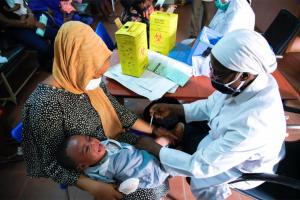Nigeria drives routine immunization amid COVID-19
Kano, 13 May 2020 – At the Hasiya Bayero Paediatric Hospital in downtown Kano, the commercial nerve centre of northern Nigeria, Aisha Iliasu sits patiently among other women and children on a concrete bench in the waiting room. Two large posters providing tips for COVID-19 prevention are taped to the wall beside her.
Despite the lockdown in place in the city, Ms Iliasu has come to the hospital for a routine measles vaccination for her nine-month old son.
“I do not want him to miss the vaccine. He has taken all the doses so far, and this is the final one,” she says. “I was initially sceptical about coming to the facility as I thought the health workers would not be around, but all the nurses are here and attending to the children as usual.”
Every year, millions of lives are saved due to routine immunization, which is widely recognized as a one of the most successful and cost-effective public health interventions. However, in Nigeria, over three million children under one year are still either unvaccinated or under-vaccinated.
The COVID-19 pandemic has posed new obstacles to vaccination in the country as well as to the surveillance of vaccine-preventable diseases across much of Africa. As the continent responds to the novel coronavirus, there is a significant risk that more children will miss out on life-saving vaccines that can prevent diseases like measles and polio.
During World Vaccination Week at the end of April, Dr Matshidiso Moeti, the World Health Organization (WHO) Regional Director for Africa, reiterated the importance of continuing to “protect communities from vaccine-preventable disease outbreaks during this unprecedented time,” urging African countries to take innovate approaches to maintain routine immunization services and to implement strong infection prevention control practices in all health facilities.
WHO has developed new guidelines on immunization in the context of COVID-19 that stress the need for this dynamic approach and urge countries to prioritize the continuation of routine immunization of children and other at-risk groups.
Initially, information collected by WHO from various hospitals and clinics in Kano suggested that there had been a worrying decline in client attendance at health facilities due to a lack of awareness of continued routine immunization, as well as fear of COVID-19 infection and transport issues arising from lockdown measures. Some health care workers were also afraid to go to work as a number of their colleagues tested positive for the virus.
To improve delivery and continuity of immunization services in Nigeria, and to make sure both health care workers and patients are safe, the National Primary Healthcare Development Agency (NPHCDA), with support from WHO, has put measures in place to ensure that no eligible person misses routine immunization in the country.
“Several guidelines and materials have been developed to guide the conduct of immunization and other primary health care services at relevant facilities during the COVID-19 pandemic,” says Dr Faisal Shuaib, Director General of the NPHCDA.
WHO Nigeria has provided technical support in the development of these guidelines. “This is integrated in the COVID-19 response plan for primary health care, an important pillar for providing essential health services during this pandemic,” said Kofi Boateng, WHO Nigeria focal point for Routine Immunization.
WHO has also supported NPHCDA in setting up virtual trainings on infection prevention control measures for local health care workers, which has helped those previously afraid to go to work to feel safe to return and empowered them to ensure the well-being of their patients. These health care workers have also now been provided with crucial personal protective equipment.
Community sensitization programmes on routine vaccinations have also been scaled up in recent weeks, and have included door to door dissemination of important information materials. These programmes have also entailed consistent engagements with traditional and religious leaders, who play a key role in mobilizing their communities.
Currently, routine immunization is ongoing in all 36 Nigerian states. Mairo Mohammed, a nurse who administers vaccines at Hasiya Bayero Paediatric Hospital, said there has been a marked improvement in turnout compared to the beginning of the pandemic.
“Initially, we had the challenge of low turnout from both health workers and caregivers who were scared to come to health facilities for fear of infection,” she said. “But now they have been made aware that immunization activities are still going on as usual, and they also better understand the measures they can take to protect themselves.”
Technical Contacts:
Dr Richard Banda; Email: bandari [at] who.int (bandari[at]who[dot]int); Tel: +234 803 535 4875
Dr Boateng Kofi; Email: boatengko [at] who.int (boatengko[at]who[dot]int); Tel: +234 706 449 1772



